Image: Eva Rinaldi, Wikimedia Commons, CC-BY-SA-2.0.
Sir James Dyson, the inventor of the bagless vacuum cleaner, has been in the news a lot recently. A prominent supporter of leaving the EU from the outset, he’s become a cheerleader for ‘hard Brexit’, telling Newsnight last week that he expects negotiations to fail and the UK to exit Europe without a deal, falling back on WTO rules.
Rather than fearing such a cataclysmic outcome, Dyson seems to relish the prospect. In his interview for the Sunday Times Rich List earlier this year (£), he enthused about post-Brexit Britain becoming the Singapore of Europe: “Singapore is a great example. It has free trade and high technology… You pay for education according to how wealthy you are. You insure yourself for health. But the maximum tax rate is 22%. Amazing.”
Dyson has also been making headlines lately by warning the Government not to cut farm subsidies after Brexit. Commentators have been quick to point out that Dyson himself is one of the biggest beneficiaries of the current system of farm subsidies: last year, his company, Beeswax Farming (Rainbow) Ltd, received £1.8million in payments. Over £1million of that was under the Basic Payment Scheme, which is essentially a subsidy for owning land. It comes with minimal strings attached, and the more land you own, the more you get.
And boy, does Sir James own a lot of land. In 2014 the Daily Mail reported that Dyson “now owns more land in England than the Queen”: some 25,000 acres (as against the mere 20,000 acres owned personally by her Maj at Sandringham). The Land Registry’s Corporate & Commercial dataset, as revealed in an FOI response from 2015, lists Beeswax Farming as owning 21,891 acres. By July 2017, Farmers Weekly was reporting that Dyson’s empire had grown to 13,355 hectares, or 33,000 acres.
I decided to track down and map what Dyson owns. That’s proven easier said than done; Beeswax Farming’s website pinpoints a few of the main estates, but leaves out others. But I’ve been able to map around 20,000 acres of Dyson’s land, with more details below:
- Nocton Estate, Lincolnshire. Once the estate of the Marquis of Ripon, then a vast potato farm, Nocton was bought by Dyson in early 2013, reportedly for £150million (as part of a wider investment in Lincolnshire farmland). An old map of the estate, courtesy of a local blogger, shows its extent; measuring the INSPIRE polygons that approximate to this show it to cover around 8,000 acres, which tallies with this account of the pheasant shoot that stretches over it.
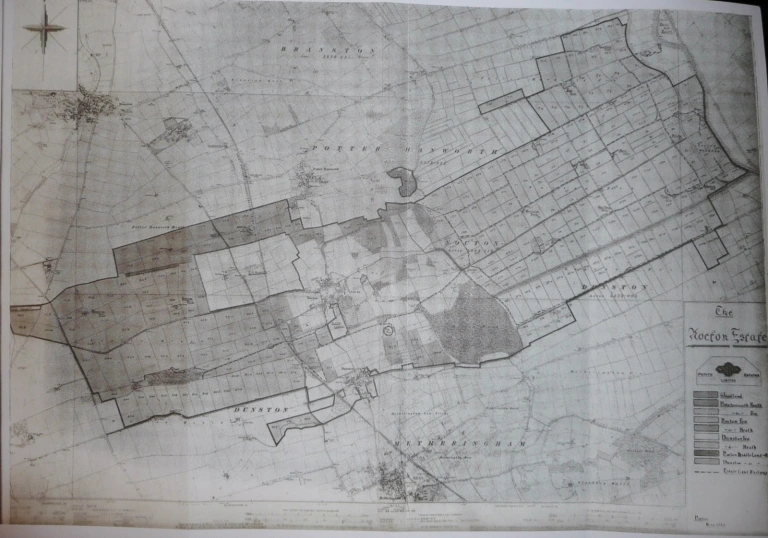
- Carrington Estate, Lincolnshire. Bought alongside Nocton in 2013. Previously, under a different owner, this 2008 article in Farmers Weekly states the Carrington Estate to have been 6,424 acres. The Carrington Estate is the only part of Dyson’s land empire to be receiving cash for Environmental Stewardship schemes. Measuring Natural England’s maps of these suggests Carrington to be around 4,867 acres, but then they probably don’t cover the full estate.
- Cranwell & Roxburgh Estates, Lincolnshire. Bought off The Crown Estate in Dec 2014 and reported to be 3,000 acres. Lincolnshire Council still holds maps of the estates from when they were owned by the Crown, and deposited under the Highways Act s31.6. Redrawing the s31.6 maps and measuring them suggests the estate is a little bigger than reported, maybe around 3,730 acres.
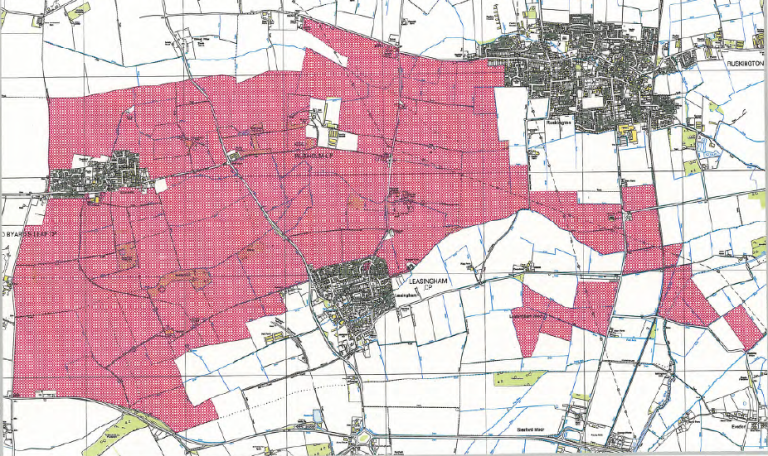
- This recent tweet shows Dyson also owns other farmland in Lincolnshire that I’ve not been able to track down from other sources:
- Dodington Park, Gloucestershire – Dyson’s palatial mansion and park, bought in 2003 for £15 million. Dyson got in trouble in 2016 for installing a big underground swimming pool without full planning permission. Historic England has mapped the parkland accompanying the mansion and states it to be around 700 acres.

- Ack Ack Farmyard, Gloucestershire – another farm listed on Beeswax Farming’s website, further details unknown.
- Churn Estate, Oxfordshire. Dyson was rumoured to be hunting for farmland in Oxfordshire in 2013. He appears to have acquired the Churn Estate, in the North Wessex Downs, off the University of Reading (whose Highways Act maps from 1996 record it as belonging to them). Redrawing these maps and measuring the area shows it to cover about 1,719 acres.
So why has Dyson bought up all this land, mostly over just the past 5 years? After all, it’s not exactly core to his business as an inventor and entrepreneur.
Dyson professes the reason to be his love of the countryside, having grown up in rural Norfolk. But the farm subsidies mentioned earlier must surely help. And he’s also benefitting from other subsidies, introduced in the past decade, to incentivise the production of electricity and heat from Anaerobic Digestion (AD). AD can be a great way to generate renewable power from agricultural wastes. But increasingly, farmers are simply growing vast fields of maize to use as fuel for AD plants. Having covered just 1,400 hectares in 1970, maize is now grown over 183,000 hectares (452,000 acres) of England – leading to soils being tilled during the rainy season, which simply worsens floods in our increasingly rainy climate as the water flashes off bare earth.
Dyson’s farming company proudly talks about its state-of-the-art AD plants on its website. And a new Crop Map released by DEFRA allows us to see just how much of Dyson’s Lincolnshire estates are planted with maize. Below are the results for maize grown at his Nocton and Carrington estates, the maize denoted by red hexagons:
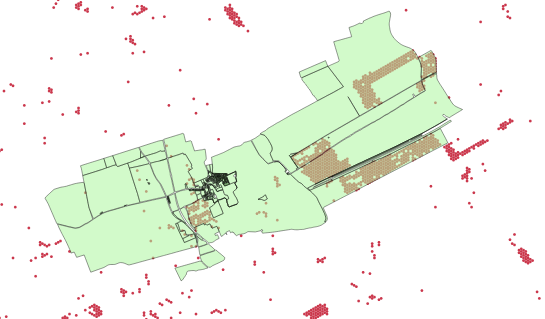
Nocton, above; Carrington, below.
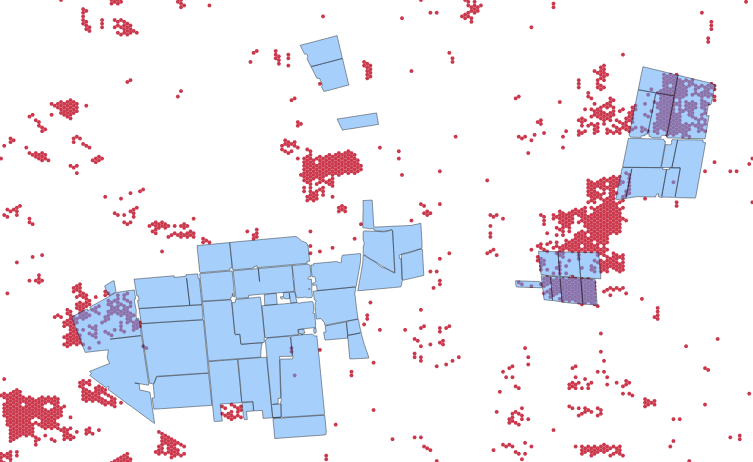
Lastly, various commentators suggest that Dyson’s investment in land is a good way to avoid inheritance tax. Lancaster Guardian columnist Gary Rycroft opines that “what Sir James is doing is buying up a very handy tax shelter.” The Evening Standard’s Home & Property section, reporting on one of Dyson’s purchases, commented: “The savvy move may mean that his three children could avoid a substantial chunk of inheritance tax, as it is not incurred on farmland.” Farmers’ Weekly, in an article on Dyson’s investments, has stated: “Buying farmland is popular with many wealthy investors because it doesn’t incur inheritance tax. Some critics feel this unfairly bumps up land values, pricing ‘genuine’ farmers out of the market”.
Viewed from this angle, it all starts to make sense. Dyson’s vast investments in prime farmland, his political support for hard Brexit and turning Britain into low-tax Singapore, all share a common aim: maximise income, minimise outgoings.
I find a number of things about James Dyson admirable. His farm business at least talks the talk of sustainability and in some ways appears to be practising it. He’s clearly committed to encouraging engineering talent and his support for renewable energy and battery technology is much-needed. But Dyson’s vision of post-Brexit Britain as a tax haven for the rich where taxpayer subsidies nevertheless still flow to big landowners? Now that really sucks.
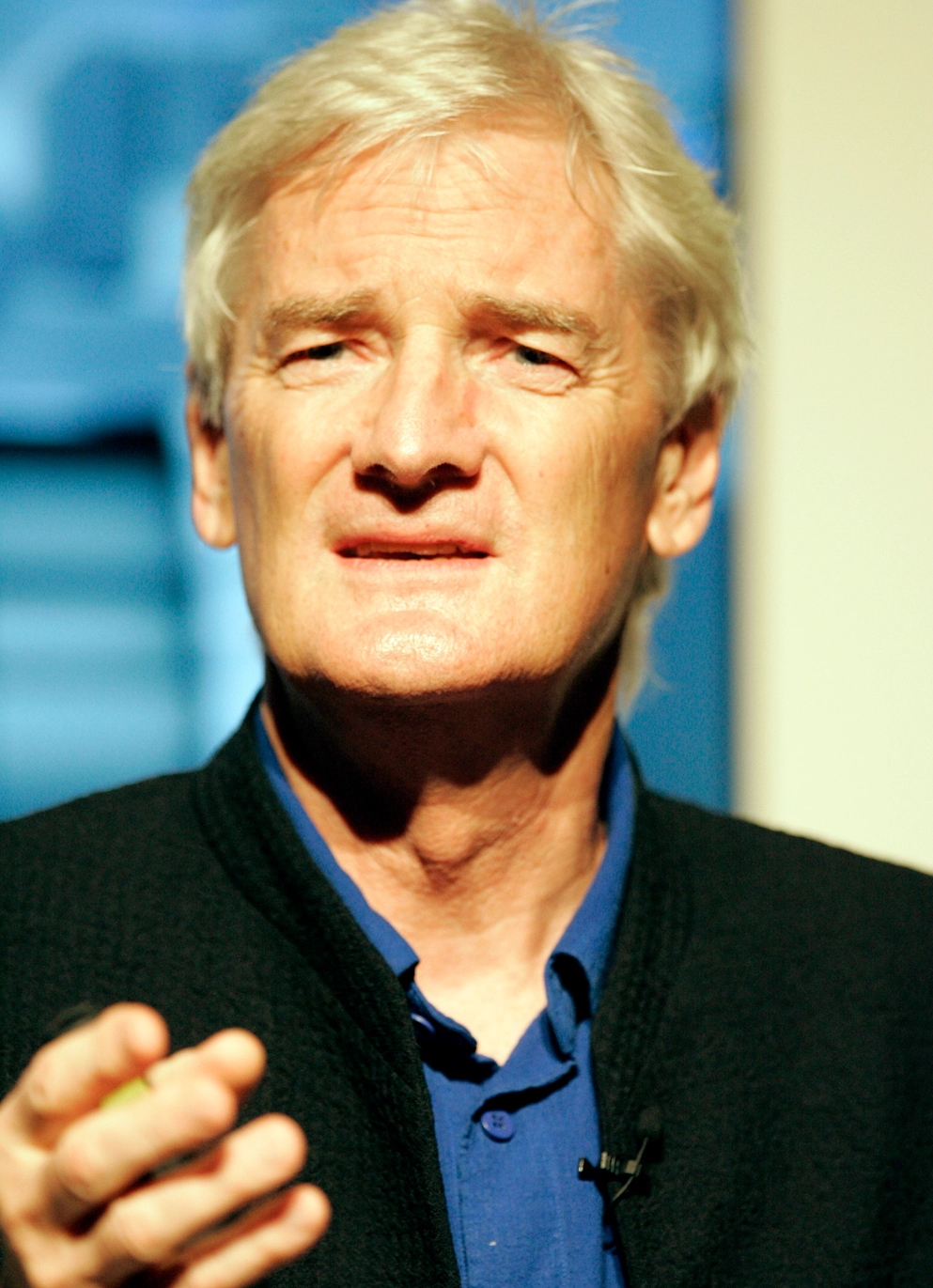
Would you be up for coming over and speaking in Halifax on your work? I am a member of the Trades Council and active in many other organisations.
LikeLike
Although Dyson’s purchases predate the referendum, under a ‘hard Brexit’ scenario, if tariffs are introduced for imports this promotes domestic production and purchase of crops and produce. As land is clearly a limited resource, the value of it would increase in line with a desire for food security.
But, as you say, I suspect tax protection is probably a major motivation – but this is not new. For example, when Lady Desborough died in 1952, tax mitigation through agricultural land purchases in Yorkshire, Lancashire, Derbyshire and Suffolk, via the Desborough Settlement Trust, meant that on an estate of £406,685 the tax liability was £12,426. (Source: England’s Lost Houses – Giles Worsley)
LikeLike
He & JK Rowling are the only two of Britains Super Rich to pay any significant amount of income tax
LikeLiked by 1 person
Thinking about it of course given that his products are manufactured outside the EU BREXIT isn’t necessarily a major threat to his business
LikeLike
He’s one of the few who will financially benefit from brexit.
With the new Singapore / EU FTA (and potentially more ASEAN deals to follow), he’ll continue to export his products to the EU with preferable tariffs, while his UK competitors are left to flounder outside the EU, with the ‘No Deal’ brexit he advocates.
LikeLike
You need to read a book called The Secret Life of Real Estate and Banking by Phil Anderson (the man deserves a Nobel Prize for his work), once you have read this you will understand that it is land value that drives the boom and bust cycle that happens every 18 years. The only way to stop this boom and bust is to get rid of income tax and institute a land value tax, have a look at the work of Henry George the economist once you have read Phils book. The Henry George society has some very interesting reading.
Enjoy!
LikeLike
I live in Lincolnshire and this absent, obscenely wealthy man adds nothing to the community except outpricing smaller farmers who struggle on a daily basis….not the Range Rover driving elitists such as James Dyson and other land rich ‘farmers’…some even drive Aston Martins…go figure?
LikeLiked by 1 person
What is sir james opinion on the brexit talks
LikeLike
Beeswax Dyson recently bought Leadenhall Farm, Holbeach St Marks, Linc’s, PE12. Quite a few acres there as well
LikeLike
Dyson has been very clever. He’s salesman rather than inventor. His first effort, the ballbarrow, was a simple and sensible idea but shoddily built. There probably aren’t even enough left for wheelbarrow museums.
All those who become super rich turn a bit peculiar. The favourites are turning to God and believing you’re superman.
I think he’s the latter but suspect for a very long time those with the groundbreaking ideas are employees not the man himself.
Have just heard he’s invested a huge sum in more farmland adjacent to the Sutton Hoo Anglo Saxon burial site here in Suffolk
LikeLike
Beswax Dyson have recently bought most of the village of HInton Charterhouse in Somerset (where his sons live) and land that borders on SSSI. They are turning this pasture land into cereal crop production and huge intensively farmed fields… Its really sad as we will lose the bats that forage the beetles that live on the dung of the dairy cattle and we will lose the patchworks of small fields that are great for dormice etc… We are one of the last strongholds for British wildlife and he looks set to destroy it…. Dyson talks a good talk about ecology but essentially he makes money not good environmental practice.
LikeLike